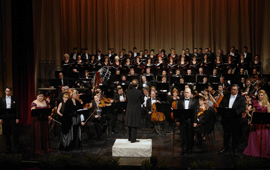> [Archived] Chronicles

'Gioconda' or the State of Grace
Therefore, the cheered artist at the Covent Garden in Amneris, at Metropolitan in Azucena and recently in La Scala in Santuzza , she wanted to reappear on stage in Timisoara. This time she approached, at the debut, a role written for dramatic soprano - Gioconda from the homonymous opera by Ponchielli - under the baton of the same experienced and avid David Crescenzi. The American mezzo-soprano has expressed her wish to reunite with tenor Calin Bratescu, which seems to evolve from a sheet to another.
Interpreters who know what expressiveness is
And behold, on 25 March, "true" audiophiles, who know how to appreciate great artists and enjoy (re) discovering (also) works less performed in our country, came especially to Bucharest, even from Germany to listen, as the people in Timisoara, to that opera in concert which enjoyed a very homogeneous distribution, with beautiful and wide voices, with performers who know what means to get involved into shaping their character, giving emphasis to accents, experiences, averments fraught with meanings, in one word expressiveness, creating moments of emotional and dramatic intensity, which can rarely be watched "live".
Of course, the focus was Marianne Cornett, whose overwhelming voice, accompanied by an ardent temperament, but perfectly controlled by explosion (which... is not a paradox) with a very broad ambitus, conquered and impressed in a permanent emotional crescendo, culminating in the last act, not only through the formidable area, but also through the tragic end. Of course, after this sumptuous debut, she will work out the ideal way to hit the high and low notes according to the dreadful, but superb sheet of Ponchielli's work, during the shows that she has scheduled around the world.
With his known reliability and constant desire to reach the audience's expectactions, tenor Calin Bratescu outdone himself, performing impeccably the character of Enzo, with the voice that took on a major addition, with undoubted technique and especially with a pregnant outlining of the emotions and concerns of the desperate, furious, desolate or in love hero, but keeping the note of dignity and pride of the noble struggling to do justice, to be with Laura. And the young girl equally in love, but lyrical, glowing and sensible, found in mezzo-soprano Liliana Matei-Ciuca an adequate singer with a warm timbre, elegant phrasing, with brilliant high notes and equality of registers which we have been waiting for so long, emphasizing femininity and stage presence also, the honest feeling through which the role becomes credible and convincing.
In turn, overcoming the inherent flutter, the young Korean baritone Kim In-Hui, after a few lines perhaps more neutral, showcased a generous, comprehensive and qualitative voice, with powerful high notes, incisive and able to give the image of Barnabas, whose dark side was permanently stressed, stirring deserved applause.
Interesting and inedited, that evening, three very different mezzo-soprano voices in terms of color met, Hye Youn Park with a deep low voice and a singing line just right for Cieca, although perhaps too discreet. Another low voice, but whom we have known for a long time - the bass Sorin Drăniceanu - stood out as Alvise, a very wide part in which beauty of timbre and the "heaviness" given to the musical speech made him stood out without doubt. Even in the background parts the quality sound of each line remained unaltered, as Gelu Dobrea, Marius Zaharia, Iulian Ioan Iosip and Mihai Prelipcian built a high class cast.
Highly demanded, the choir (thoroughly prepared as usual with Old Laura) sounded harmoniously, with a varied palette. The orchestra, always appreciated at its best, created impressive pages, with contrasting plans, sometimes tensioned, sometimes lyrical, sometimes with a special charm (in the famous Dance of the Hours), following the conductor's intentions always expressed with clarity and precision, with a gesture without excess but full of efficiency and plasticity. Thus, David Crescenzi coordinated rigorously the whole vocal orchestra "machine", intuin the expressive intentions of the soloits, following them with suppleness and flexibility, avoiding gaps and still coddling the voices that were not covered in any way during the moments of spectacular ongoing.
An interpretative version that would honor any great lyrical stage
At such a level, with such performers - in the proper sense of the word - it was created an overview and a special vibration that surrounded the stage and hall. The voices often superb, the diction and utterance in Italian, mastering and understanding the sheet which, fortunately, is not confined to a correct reading, but rather the expressiveness and consistency of characters, the relations between them, determined even the most fastidios people not to look for"stains in the sun" and indulge in the great music under the interpretative version that would honour any great lyrical stage. And this while the most performers were ...debutants!
Many may be surprised by the avalanche of praises liberaly scattered in the comment, but those who were in the Opera House in Timisoara, listening to Gioconda that night, must admit that they experienced a moment of grace, appreciated and applauded as deserving, as appropriate at such a reference event.
And the fact that Marianne Cornett was really excited about the whole team, about the atmosphere and the "positive energy" reigning in the days of rehearsals, about the involvement and the joy with which everyone attended the theater, and this time, at that memorable achievement - as the illustuos mezzosoprano wishes to return soon to Timisoara - supports what I have said, far from any subjectivity, the most likely person to judge reality by comparison with the great stages of the world where she has been performing for a long time the same way Leo Nucci and Roberto Scandiuzzi and ...were conquered.
Translated by Iulia Florescu
MTTLC, Bucharest University














